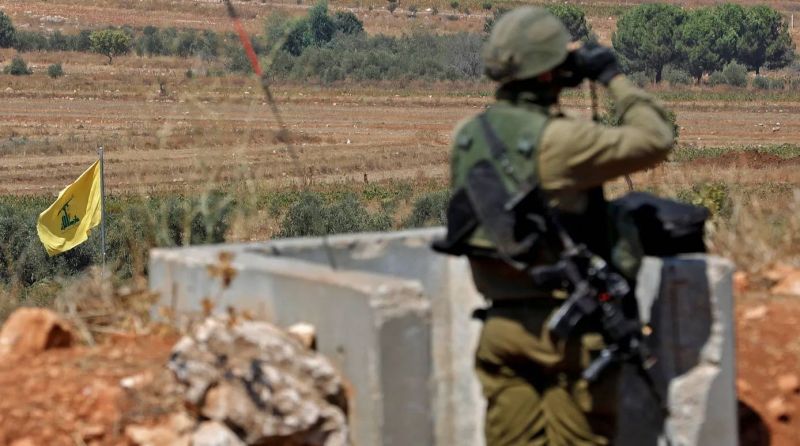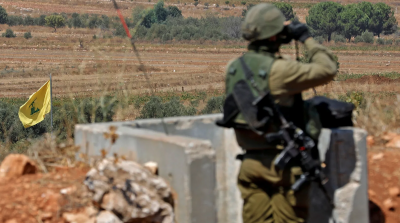
An Israeli soldier observing the Blue Line in September 2022. (Credit: AFP/File photo)
Hezbollah launched a barrage of rockets Sunday morning on the Israeli-occupied Shebaa Farms area, prompting Israeli fire in response.
The situation seems to be calming, with analysts arguing that the fighting is not likely to escale on the southern Lebanon front.
In April, Hezbollah announced “unity” among the key players of its axis, stretching from Iran to Lebanon and encompassing Syria and Gaza. Given that the group has now seemingly tested Israel's reaction to strikes, will they stand by their Palestinian allies amid calls for armed factions in Lebanon to join the fight?
While caution appears to be the prevailing sentiment for now, the possibility of escalation can't be ruled out.
A strategic time for attack
On Saturday morning, Hamas initiated an unexpected operation named “Al-Aqsa Flood,” in reference to the third holiest site in Islam. They launched thousands of rockets, infiltrated nearby settlements, and reportedly captured dozens of Israelis.
Initial reports indicate around 200 deaths in Gaza due to retaliatory Israeli airstrikes, and around 70 deaths and many injuries on the Israeli side.
The timing of this military offensive was deliberate. It occurred just a day after the 50th anniversary of the 1973 war that saw Syria and Egypt blindside Israel and exposed deep vulnerabilities in Israel's alert system.
Saturday’s operation also marks 23 years since Hezbollah's first attack against Israel following Israel's withdrawal from Southern Lebanon. In that incident, Hezbollah crossed the UN’s Blue Line and abducted three soldiers near the Shebaa Farms area, setting the stage for subsequent events that would lead to the July 2006 war.
Hezbollah’s stance
For now, Hezbollah’s response has been limited.
“This is a resolute response to the crimes of the occupation and the ongoing assaults against the sacred and the dignified,” a statement released by the party on Saturday reads. The statement also calls upon Arab and Muslim nations to express their solidarity with the Palestinian people.
This appeal emerges just as ties between Saudi Arabia and Israel appear to be strengthening, several years after the Abraham Accords were signed between Tel Aviv and several Arab countries including the UAE, Morocco, Sudan and Bahrain.
However, beyond this moral support, it seems Hezbollah might be reluctant to initiate a fresh confrontation with Israel, especially given the deteriorating political and economic condition of Lebanon.
“In the past, Hezbollah has often distanced itself from violent outbreaks between Gaza and Israel,” Joe Macaron, a Middle East analyst, told L’Orient-Le Jour. “They will likely enter the battle only if explicitly requested by Hamas.”
Uncertainty
Michael Young, a researcher at Beirut’s Malcolm H. Kerr Carnegie Middle East Center, shares a similar sentiment. “Through this operation, Iran might be signaling its ability to diversify its attack strategies, similar to Israel's tactics in Syria,” he said.
“However, I'm uncertain if Hezbollah will directly engage in combat in the immediate future, though they might allow allied Palestinian factions to strike from southern Lebanon.” Young recalled earlier incidents in April, when Hezbollah permitted groups allied with Hamas to fire Katyusha-type rockets at Israel-controlled territory in retaliation to Israel's provocations at the al-Aqsa mosque.
Many experts believe that Hassan Nasrallah's party aims to bolster Hamas's foothold in Palestinian camps in Lebanon. This could explain the recurring skirmishes in the Aïn el-Héloué camp, the largest Palestinian settlement outside of Palestinian territories, where Fatah (representing the Palestinian Authority, a rival of Hamas) confronts smaller Islamist groups.
Nicholas Blanford, a Hezbollah expert at the Atlantic Council, echoed these sentiments. “We can't dismiss any possibility,” he told L’Orient-Le Jour. “Given the unprecedented nature of Hamas' actions, Hezbollah might be driven to adopt more aggressive tactics, like a raid on the Shebaa Farms or along the Blue Line. However, I believe they would tread cautiously to avoid triggering an open war.”
In the event of an escalation, two factors may be decisive for Hezbollah and its Iranian sponsor. The Lebanese and regional context must be assessed, balancing the risk of strengthening Hezbollah’s and Iran’s potential intervention with the risk of further isolation at the end an offensive. They must also evaluate the Israeli security apparatus' ability to respond to an attack from southern Lebanon. If the Hezbollah-Tehran axis believes that Israel is sufficiently weakened to change the rules of the game, they might be tempted to open a second front. But we are not there yet at the moment.
Sources close to Hezbollah also indicate that an intervention from Lebanon is plausible.
“In Haret Hreik [south of Beirut], we're closely monitoring the situation and aren't dismissing any potential outcome," noted Kassem Kassir, an analyst closely aligned with the party.
Faisal Abdel Sater, another observer close to Hezbollah, suggested that whether or not Hezbollah openly engages in this conflict will largely depend on Israel's actions.
On the southern end of the Blue Line, preparations for any eventuality are underway as the Israeli military strengthens its border defenses.
This article was originally published in French in L'Orient-Le Jour.
